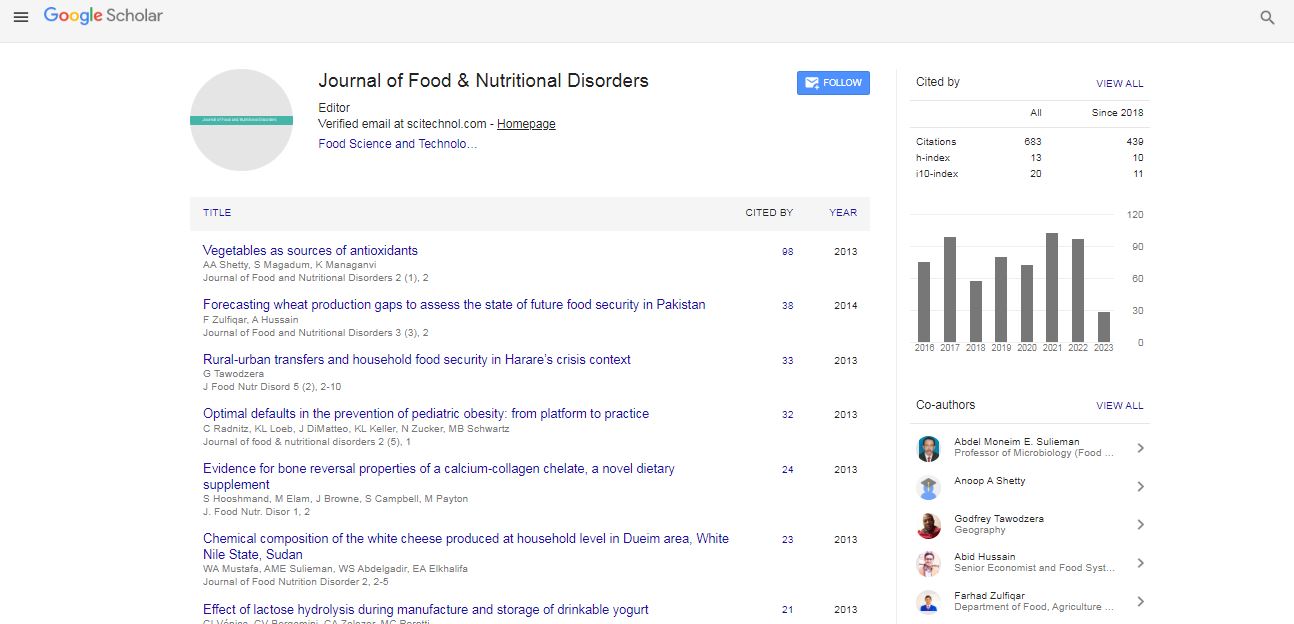Editorial, J Food Nutr Disor S Vol: 0 Issue: 0
The Role of Prebiotics and Probiotics in Human Health
| Bahram H. Arjmandi* and Sarah A. Johnson | |
| Department of Nutrition, Food and Exercise Sciences, The Florida State University, Tallahassee, FL 32306, USA | |
| Corresponding author : Bahram H. Arjmandi Director for the Center for Advancing Exercise and Nutrition Research on Aging, Department of Nutrition, Food and Exercise Sciences, The Florida State University, 436 Sandels Building, Tallahassee, FL 32306, USA Tel: (850) 645-1517; Fax: (850) 645-5000 E-mail: barjmandi@fsu.edu |
|
| Received: March 29, 2014 Accepted: March 30, 2014 Published: April 01, 2014 | |
| Citation: Arjmandi BH, Johnson SA (2014) The Role of Prebiotics and Probiotics in Human Health. J Food Nutr Disor S1-e001 doi:10.4172/2324-9323.S1-e001 |
Abstract
The Role of Prebiotics and Probiotics in Human Health
Human health by far depends on gut health. It is no wonder that many ancient traditional medicine practitioners and philosophers asked about bowel function when a patient presented with common ailments such as a headache and lack of energy. As far back as 400 B.C., Hippocrates was quoted as saying “…death sits in the bowels…” and “…bad digestion is the root of all evil…” in 400 B.C.
| Human health by far depends on gut health. It is no wonder that many ancient traditional medicine practitioners and philosophers asked about bowel function when a patient presented with common ailments such as a headache and lack of energy. As far back as 400 B.C., Hippocrates was quoted as saying “…death sits in the bowels…” and “…bad digestion is the root of all evil…” in 400 B.C. [1]. Socrates once said, “As it is not proper today to cure the eyes without the head nor the head without the body…” [2] and it is known that health is incomplete without gut health. In fact, the gut is known to produce a number of vital chemicals including serotonin which is involved in regulating overall well-being and mood [3]. As discussed in his most famous work “The Canon of Medicine”, the ancient Persian philosopher Avicenna believed that gastrointestinal problems can directly transfer to other bodily tissues therefore simultaneously causing other health problems [4]. Therefore, it can be said that the importance of gastrointestinal health in human health has long been recognized and it can be suggested that approaches to improve gut health can improve overall health and well-being. | |
| It is thought that there are over 100 trillion microorganisms residing in the human gut, including bacteria, fungi, algae, and protozoa, making up what is known as the microbiome [5]. The microbiome and its byproducts play a vital role in overall health and/or disease depending on the strains of microorganisms that predominate [5-7]. For instance, bifidobacteria and lactobacilli are known to be protective to the gut [7] while Helicobacter pylori bacteria are a known contributor to the development of gastric ulcers and cancer [8]. The gut microbiome is involved in the development of a number of clinical diseases and conditions including inflammatory bowel disease, irritable bowel syndrome, colorectal cancer, and gut-derived infections and research is supporting a link between the gut microbiota and appetite control, energy balance, obesity, diabetes, immune function, cardiovascular disease, and cancers such as stomach cancer [5]. Hence, it is crucial to favorably alter the gut microbiome to promote gastrointestinal health and therefore subsequently overall health. | |
| This special issue will address the role of prebiotics and probiotics in overall health and wellness, including their role in preventing and/ or treating disease. Additionally, we will address the interrelationship between the microbiome and nutrient and non-nutrient compounds as well as metabolism and mechanisms of disease prevention. | |
References |
|
|

